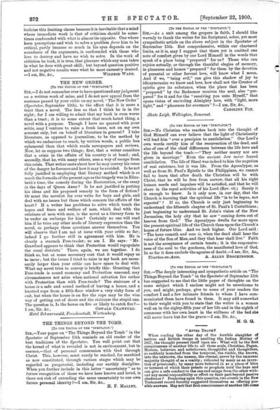THE NEW ORDER.
(To TEE EDITOR OF THE .sescr.aros..1
do not remember ever to have questioned any judgment on a written work of mine, and I do not now appeal from the sentence passed by your critic on my novel, " The New Order" (Spectator, September 15th), to the effect that it is more a
tract than a novel The less so that I think he is in the right; for I am willing to admit that my book is even worse than a tract ; it is to some extent that much hated thing, a novel with a purpose. Though I have no quarrel with your critic, may I venture to raise a fresh issue, not on my own account only, but on behalf of literature in general ? I take literature, as opposed to journalism, to be the method by which we endeavour to reach, by written words, a public less ephemeral than that which reads newspapers and reviews. Now, let us suppose two things; first, that a writer considers that a crisis in the affairs of his country is at hand; and, secondly, that he, with many others, sees a way of escape from this crisis. That writer casts about how he may convey his sense of the danger he foresees and how it may be avoided. Is he not fully justified in employing that literary method which is as much the formula of the present age as the tragedy was in Eliza- beth's time, the comedy during the Restoration, or the essay in the days of Queen Anne ? Is he not justified in putting his ideas and his proposed remedy in the form of fiction? Or must the novelist for ever write for boys and girls, and deal with no issues but those which concern the affairs of the heart? If a writer has problems to solve which touch the hopes and fears and welfare of men, which deal with the relations of men with men, is the novel as a literary form to be under an embargo for him? Certainly no one will read him if he tries any other mode of literary expression than the novel, so perhaps these questions answer themselves. You will observe that I am not at issue with your critic so far; indeed I go further still in agreement with him. He is clearly a staunch Free-trader; so am I. He says : "Mr. Crawfurd appears to think that Protection would repopulate the rural districts." There, again, we are together. I do thinl, so, but at some necessary cost that it would repay us to incur; but the issues I tried to raise in my book are neces- sarily larger than your critic can have space to deal with. What my novel tries to convey is briefly this : Granting that Free-trade is sound economy and Protection unsound, may circumstances not arise when national salvation lies rather with Protection than with Free-trade? The staircase of a honse is a safe and sound method of leaving a house, and a knotted rope from a fifth-floor window a very risky form of exit, but when the house is on fire the rope may be the wise way of getting out of doors and the staircase the stupid one. The question is, Is the house on fire or likely to catch fire ?--






































 Previous page
Previous page